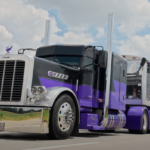According to the American Trucking Associations, the typical age of long-haul truck drivers is around 46 years old. However, a recent survey conducted by CCJ among over 800 leased owner-operators and company drivers suggests that a 46-year-old driver might actually be considered relatively young compared to their peers.
The survey results revealed that almost 70% of the respondents had more than two decades of experience in truck driving. None of the other experience groups, including those with 16-20 years, 11-15 years, 6-10 years, and 5 years or less of experience, made up more than 10% of the respondents. As a result, the average age of the respondents was 60 years old, with a mean age of 58 and a mode of 62.
Among drivers aged 55 and above, saving for retirement was their second biggest concern. The top two concerns for this age group, each with 25% of respondents, were paying monthly bills and health. Retirement savings was also a concern for the 35-54 age group, ranking as the third highest priority. However, for drivers up to 34 years old, retirement savings was not a priority at all, with 0% of respondents listing it as a concern.
Between the years 2020 and 2022, more than half (52%) of the survey respondents stated that their fleet had increased their pay at least twice. While this has helped alleviate the issue of needing money in the short-term, the problem of retirement planning still persists for many truck drivers.
In the latest What Drivers Want survey by CCJ, almost one-quarter (23%) of all respondents, including both company drivers and leased owner-operators, claimed that if they were running a fleet, they would increase pay to attract and retain drivers. Meanwhile, 18% of the respondents stated that they would provide guaranteed pay, loads or mileage to make the take-home pay more predictable. The third most popular response, with 14%, was offering excellent health benefits and a 401(k) retirement plan.
“We need to go back to employer-provided pensions,” suggested company driver William Kolar.
In the survey, it was found that only 42% of company drivers reported that their employers offered some form of retirement program, while 85% of leased drivers gave the same response. Additionally, almost 30% of the drivers who participated in the survey stated that they were not saving for retirement. The results also showed that company drivers were slightly better prepared for retirement than leased drivers, with 25% of company drivers stating that they were not saving for retirement, compared to 35% of leased drivers.
“I don’t have the word retire in my vocabulary, and I don’t save money,” said 53-year-old leased owner-operator Mark Howell. “I borrow as much as they will give me, then create equity and cash flow. There is no reason to use the word retirement if you have a lifestyle that is as fun as possible doing whatever you want. Retirement is not fun-sounding at all. It’s a depressing word for people that are slaves and don’t know it.”
According to the survey results, only 23% of the respondents plan to retire by the age of 67. More drivers plan to keep driving for as long as their health allows (26%), while others are undecided (32%). Only 8% of the respondents intend to retire in the current year. Interestingly, the oldest group of drivers (aged 55 and above) plan to drive for the longest period of time, with 13% stating that they plan to continue driving until they reach 70 years of age.
“At 70 I would consider driving part time,” Kolar said.
In the survey, it was found that among the drivers who do not plan on retiring anytime soon, 34% stated that it was because they need the money. However, 37% of the respondents said that they are not planning on retiring because they enjoy their job, while another 28% stated that they simply do not want to stop working.
“Retire,” asked 65-year-old company driver Cliff Sees. “What would I do with my time?”
After 39 years OTR, 58-year-old leased owner-operator Scott Erickson said he still loves his job and would drive for as long as he’s healthy. “I look forward to the next day on the road,” he said.
“My truck is a recreational vehicle that pays me to drive it, and I’m getting paid to be on a permanent vacation,” Howell added.
The survey conducted by CCJ found that almost two-thirds of the respondents (63%) said that they have not saved enough money to retire, while another 15% claimed that they did not know. The results showed that 58% of the oldest respondent group stated that they do not have the money saved for retirement, which is a cause for alarm. The survey also found that in some cases, drivers might have had retirement funds at one point, but used the money to reinvest in their business.
“(I had a) 401(k), but I used it to buy a truck,” said 63-year-old leased owner-operator Orion Sebastian.
In other cases, divers too face market swings, financial misfortune, family emergencies and day-to-day life like everyone else.
“Raising three kids, putting them through college so they would have a better life, owning a home, and being an owner-operator and responsible for every breakdown has prevented us from building a comfortable retirement,” said 67-year-old leased owner-operator Lawrence Sigwald.
Source: www.ccjdigital.com





